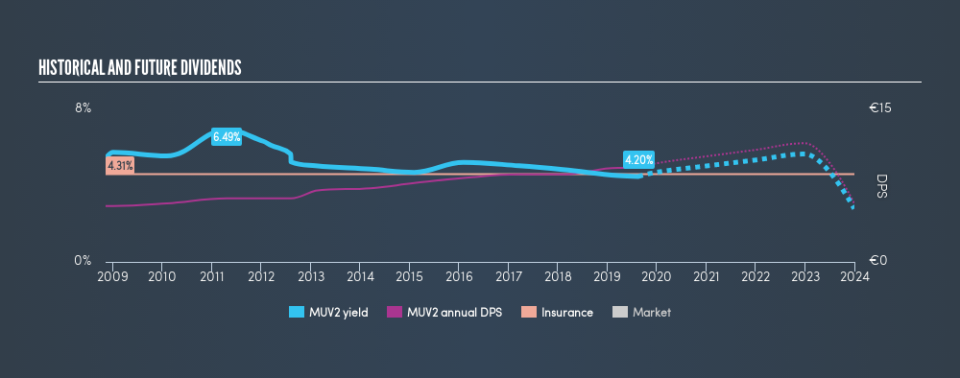Is Münchener Rückversicherungs-Gesellschaft Aktiengesellschaft (FRA:MUV2) A Smart Pick For Income Investors?

Could Münchener Rückversicherungs-Gesellschaft Aktiengesellschaft (FRA:MUV2) be an attractive dividend share to own for the long haul? Investors are often drawn to strong companies with the idea of reinvesting the dividends. On the other hand, investors have been known to buy a stock because of its yield, and then lose money if the company's dividend doesn't live up to expectations.
In this case, Münchener Rückversicherungs-Gesellschaft likely looks attractive to investors, given its 4.2% dividend yield and a payment history of over ten years. We'd guess that plenty of investors have purchased it for the income. The company also bought back stock equivalent to around 3.3% of market capitalisation this year. Before you buy any stock for its dividend however, you should always remember Warren Buffett's two rules: 1) Don't lose money, and 2) Remember rule #1. We'll run through some checks below to help with this.
Explore this interactive chart for our latest analysis on Münchener Rückversicherungs-Gesellschaft!
Payout ratios
Dividends are usually paid out of company earnings. If a company is paying more than it earns, then the dividend might become unsustainable - hardly an ideal situation. So we need to form a view on if a company's dividend is sustainable, relative to its net profit after tax. In the last year, Münchener Rückversicherungs-Gesellschaft paid out 57% of its profit as dividends. A payout ratio above 50% generally implies a business is reaching maturity, although it is still possible to reinvest in the business or increase the dividend over time.
We update our data on Münchener Rückversicherungs-Gesellschaft every 24 hours, so you can always get our latest analysis of its financial health, here.
Dividend Volatility
From the perspective of an income investor who wants to earn dividends for many years, there is not much point buying a stock if its dividend is regularly cut or is not reliable. For the purpose of this article, we only scrutinise the last decade of Münchener Rückversicherungs-Gesellschaft's dividend payments. The dividend has been stable over the past 10 years, which is great. We think this could suggest some resilience to the business and its dividends. During the past ten-year period, the first annual payment was €5.50 in 2009, compared to €9.25 last year. Dividends per share have grown at approximately 5.3% per year over this time.
Dividends have grown at a reasonable rate over this period, and without any major cuts in the payment over time, we think this is an attractive combination.
Dividend Growth Potential
While dividend payments have been relatively reliable, it would also be nice if earnings per share (EPS) were growing, as this is essential to maintaining the dividend's purchasing power over the long term. It's not great to see that Münchener Rückversicherungs-Gesellschaft's have fallen at approximately 2.4% over the past five years. Declining earnings per share over a number of years is not a great sign for the dividend investor. Without some improvement, this does not bode well for the long term value of a company's dividend.
Conclusion
To summarise, shareholders should always check that Münchener Rückversicherungs-Gesellschaft's dividends are affordable, that its dividend payments are relatively stable, and that it has decent prospects for growing its earnings and dividend. First, we think Münchener Rückversicherungs-Gesellschaft has an acceptable payout ratio. Earnings per share have not been growing, but we respect a company that maintains a relatively stable dividend. Münchener Rückversicherungs-Gesellschaft might not be a bad business, but it doesn't show all of the characteristics we look for in a dividend stock.
Without at least some growth in earnings per share over time, the dividend will eventually come under pressure either from costs or inflation. Businesses can change though, and we think it would make sense to see what analysts are forecasting for the company.
We have also put together a list of global stocks with a market capitalisation above $1bn and yielding more 3%.
We aim to bring you long-term focused research analysis driven by fundamental data. Note that our analysis may not factor in the latest price-sensitive company announcements or qualitative material.
If you spot an error that warrants correction, please contact the editor at editorial-team@simplywallst.com. This article by Simply Wall St is general in nature. It does not constitute a recommendation to buy or sell any stock, and does not take account of your objectives, or your financial situation. Simply Wall St has no position in the stocks mentioned. Thank you for reading.


